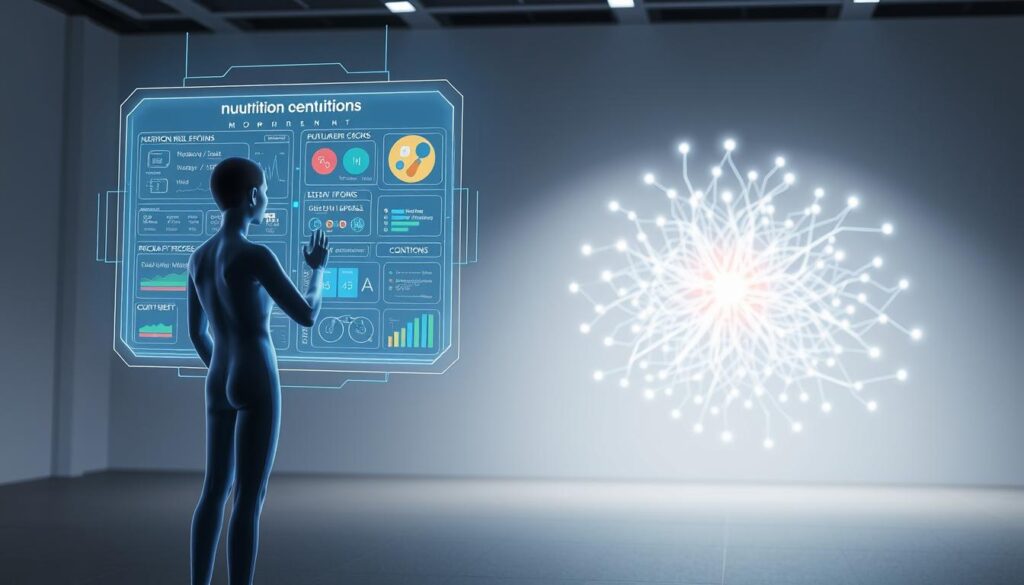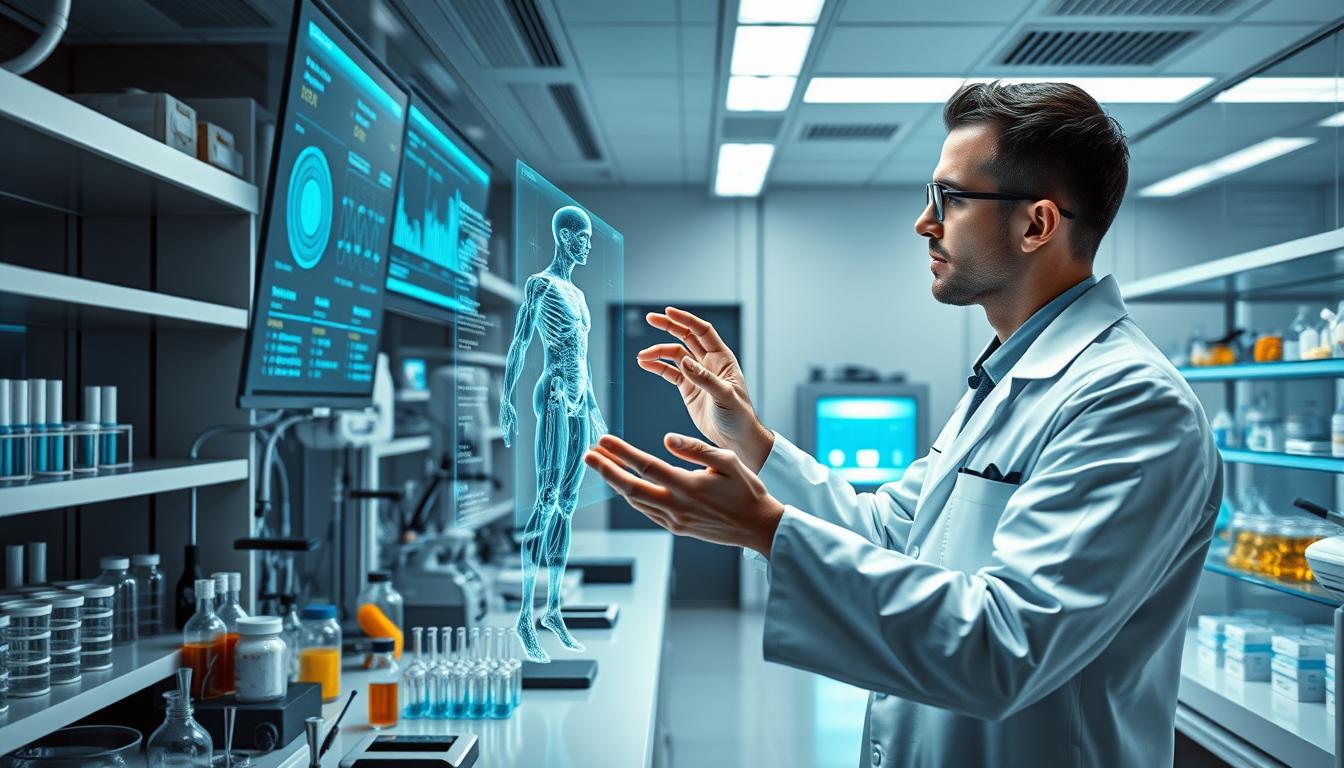Imagine having a personalized nutrition plan tailored to your specific dietary needs, lifestyle, and health goals. With the integration of AI technology in diet planning, this is now a reality. AI in nutrition is transforming the way we approach our diets, making it more efficient and effective.
The use of AI in nutrition enables the analysis of vast amounts of data to provide insights into individual nutritional needs. This technology is paving the way for more precise and personalized dietary recommendations.
Key Takeaways
Table of Contents
- AI technology is being used to create personalized nutrition plans.
- The integration of AI in nutrition is making diet planning more efficient.
- AI analyzes vast amounts of data to provide dietary recommendations.
- Personalized nutrition plans can lead to better health outcomes.
- The future of diet planning is being shaped by AI innovations.
The Evolution of Nutrition Technology
With the rise of digital tools, the landscape of nutrition planning has shifted dramatically. The way we manage our diets has become more personalized, efficient, and effective.
From Paper Food Journals to Smart Apps
The journey of nutrition technology began with simple paper food journals, where individuals would manually record their daily food intake. The advent of smartphones brought a significant shift, with numerous apps emerging to track dietary habits more conveniently. These apps not only simplified the process but also provided insights into nutritional intake, making it easier for people to make informed decisions about their diets.
The Rise of AI in Health and Wellness
Artificial Intelligence (AI) has further revolutionized the field of nutrition by offering personalized recommendations based on individual health data, dietary preferences, and nutritional needs. AI-driven platforms can analyze vast amounts of data to provide tailored advice, enhancing the effectiveness of nutrition planning.
Key Benefits of AI-Driven Nutrition Planning
The integration of AI in nutrition planning offers several key benefits, including personalized dietary recommendations, real-time tracking, and adjustments based on health data. This approach not only improves nutritional outcomes but also enhances user engagement by making diet management more interactive and less daunting.
By leveraging AI, individuals can achieve a more balanced diet, manage their weight more effectively, and reduce the risk of chronic diseases.
How AI is Transforming Nutrition and Diet Planning
The integration of AI in nutrition planning is revolutionizing the way we approach diet and health. By leveraging advanced algorithms and machine learning, AI is making it possible to create highly personalized diet plans that cater to individual nutritional needs.
AI-Powered Nutrient Analysis and Tracking
AI-powered nutrient analysis and tracking have become pivotal in modern nutrition planning. This technology enables the precise monitoring of dietary intake, helping individuals make informed decisions about their health.
Image Recognition for Food Identification
One of the innovative applications of AI in nutrition is image recognition for food identification. By simply taking a photo of a meal, individuals can track their food intake with ease. This technology uses AI algorithms to identify foods and estimate portion sizes, making dietary tracking more accurate and less cumbersome.

AI also facilitates automated calorie and macronutrient calculations, providing detailed insights into one’s diet. This feature is particularly useful for individuals aiming to manage their weight or optimize their nutritional intake for better health outcomes.
Personalized Meal Recommendations
Personalized meal recommendations are another significant benefit of AI in nutrition planning. By analyzing an individual’s dietary preferences, health goals, and nutritional needs, AI systems can suggest tailored meal plans.
Algorithm-Based Diet Customization
Algorithm-based diet customization is at the heart of AI-driven nutrition planning. These algorithms consider various factors, including dietary restrictions, health objectives, and personal preferences, to create customized diet plans that are both effective and enjoyable.
Taste Preference Learning and Adaptation
Moreover, AI systems can learn and adapt to an individual’s taste preferences over time. This capability ensures that meal recommendations not only meet nutritional requirements but also align with personal taste, making it easier to stick to a healthy diet.
Real-time Dietary Adjustments Based on Health Data
The ability to make real-time dietary adjustments based on health data is a game-changer in nutrition planning. By continuously monitoring health metrics and dietary intake, AI systems can provide timely recommendations to adjust diet plans, ensuring they remain optimal for the individual’s current health status.
In conclusion, AI is transforming nutrition and diet planning by offering advanced tools for nutrient analysis, personalized meal recommendations, and real-time dietary adjustments. As AI technology continues to evolve, its impact on nutrition planning is expected to grow, making it an exciting time for individuals looking to optimize their health through informed dietary choices.
Getting Started with AI Nutrition Tools
The future of nutrition is here, and it’s powered by AI; let’s explore how to get started with these innovative tools. As we dive into the world of AI-driven nutrition, it’s essential to understand the steps involved in harnessing the power of these tools to optimize your diet and overall health.
Step 1: Assessing Your Nutritional Needs and Goals
Before diving into the world of AI nutrition, it’s crucial to assess your nutritional needs and goals. This involves understanding your dietary requirements, lifestyle, and health objectives. Consider factors such as your age, activity level, and any dietary restrictions you may have. By having a clear picture of your nutritional needs, you can better utilize AI tools to achieve your health goals.
Step 2: Selecting the Right AI Nutrition App
With numerous AI nutrition apps available, selecting the right one can be daunting. It’s essential to research and compare different platforms to find the one that best suits your needs. Consider factors such as the app’s ease of use, the comprehensiveness of its database, and its ability to integrate with other health devices.
Top AI Nutrition Platforms Comparison
| Platform | Key Features | Integration |
|---|---|---|
| Nutritionix | Comprehensive nutrient database, meal planning | Fitbit, Google Fit |
| MyFitnessPal | Large food database, calorie tracking | Apple Health, Garmin |
| PlateJoy | Personalized meal planning, grocery lists | Fitbit, Apple Health |
Free vs. Premium Features
Many AI nutrition apps offer both free and premium features. Understanding the differences between these tiers can help you decide whether to upgrade. Premium features often include advanced meal planning, personalized coaching, and detailed nutrient analysis.
Step 3: Setting Up Your Nutritional Profile
Once you’ve selected an AI nutrition app, the next step is to set up your nutritional profile. This typically involves inputting your dietary preferences, health goals, and lifestyle information. Be as detailed as possible to ensure the app provides accurate and relevant recommendations.
Step 4: Integrating with Fitness Trackers and Health Devices
To maximize the effectiveness of AI nutrition tools, it’s crucial to integrate them with your fitness trackers and health devices. This allows for a more comprehensive understanding of your health and enables the AI to provide more tailored advice. Check if your chosen app supports integration with your devices, such as Fitbit or Apple Watch.
By following these steps, you can effectively get started with AI nutrition tools and begin your journey towards a more optimized and personalized approach to nutrition.
Practical Applications of AI in Daily Nutrition Management
The integration of AI in nutrition planning has transformed the landscape of diet management, making it more accessible and tailored to individual needs. AI’s capabilities extend beyond mere data analysis, enabling a more dynamic and responsive approach to nutrition.
Creating Customized Weekly Meal Plans
AI-driven nutrition apps can generate personalized weekly meal plans based on dietary preferences, nutritional needs, and health goals. This customization ensures that the meal plans are not only delicious but also nutritionally balanced.
Grocery List Generation
One of the practical benefits of AI in meal planning is the automatic generation of grocery lists. By identifying the ingredients needed for the week’s meals, AI apps simplify the shopping process, reducing food waste and saving time.
Recipe Modifications and Suggestions
AI can also suggest recipe modifications based on dietary restrictions and preferences. For instance, it can substitute ingredients to accommodate vegan or gluten-free diets, ensuring that meal plans remain varied and enjoyable.

Managing Dietary Restrictions and Food Allergies
AI systems are adept at managing dietary restrictions and food allergies by closely monitoring ingredient lists and nutritional content. This capability is crucial for individuals with severe food allergies or specific dietary needs, providing a safe and reliable way to plan meals.
| Dietary Restriction | AI’s Role | Benefit |
|---|---|---|
| Gluten-Free | Identifies gluten-free ingredients and recipes | Safe meal planning for gluten intolerance |
| Vegan | Substitutes animal products with vegan alternatives | Ensures nutritional balance in vegan diets |
| Food Allergies | Monitors ingredient lists for allergens | Prevents allergic reactions through safe meal planning |
Optimizing Nutrition for Specific Health Conditions
AI can optimize nutrition plans for specific health conditions such as diabetes, heart disease, or obesity. By analyzing health data and nutritional needs, AI provides tailored dietary recommendations that support health management and improvement.
Tracking Progress and Adjusting Goals
Finally, AI-driven nutrition apps enable users to track their progress and adjust their nutritional goals as needed. This feature ensures that the dietary plan remains aligned with the individual’s evolving health needs and goals.
Conclusion: The Future of AI in Nutrition
The integration of AI in nutrition is revolutionizing the way we approach diet planning and nutrition management. With AI-powered diet recommendations, individuals can now receive personalized guidance tailored to their specific needs and health goals.
The impact of AI on nutrition is multifaceted, enabling more accurate nutrient analysis, customized meal planning, and real-time dietary adjustments. As AI technology continues to evolve, we can expect even more sophisticated AI in nutrition applications, further enhancing the effectiveness of nutrition planning.
By leveraging AI-powered tools, individuals can take a proactive approach to their nutritional well-being, making informed decisions about their diet and lifestyle. As the field continues to advance, the potential for AI to positively impact public health is vast, promising a future where personalized nutrition is the norm.
FAQ
How does AI technology improve diet planning?
AI technology enhances diet planning by providing personalized recommendations based on individual nutritional needs, health goals, and dietary restrictions. It uses complex algorithms to analyze data and offer tailored meal plans, making it easier to achieve health objectives.
What are the benefits of using AI-powered nutrient analysis?
AI-powered nutrient analysis offers several benefits, including accurate tracking of calorie and macronutrient intake, identification of nutrient deficiencies, and provision of detailed insights into dietary habits. This information enables individuals to make informed decisions about their nutrition and adjust their diets accordingly.
Can AI nutrition tools accommodate dietary restrictions and food allergies?
Yes, AI nutrition tools can accommodate dietary restrictions and food allergies by identifying and excluding specific ingredients or food groups. These tools can generate customized meal plans that cater to individual needs, ensuring safe and healthy eating.
How do AI algorithms learn and adapt to individual taste preferences?
AI algorithms learn and adapt to individual taste preferences through machine learning, a process that involves analyzing user feedback and behavior. As users interact with the AI nutrition tool, it refines its recommendations to better align with their preferences, providing a more personalized experience.
Are AI nutrition tools compatible with fitness trackers and health devices?
Many AI nutrition tools are designed to integrate with fitness trackers and health devices, allowing for seamless data exchange and a more comprehensive understanding of an individual’s health and wellness. This integration enables more accurate tracking and personalized recommendations.
What is the future of AI in nutrition and diet planning?
The future of AI in nutrition and diet planning is promising, with ongoing advancements in AI technology and machine learning. As AI continues to evolve, we can expect even more sophisticated and personalized nutrition planning tools, leading to improved health outcomes and a more streamlined approach to achieving nutritional goals.
How do I get started with AI nutrition tools?
To get started with AI nutrition tools, begin by assessing your nutritional needs and goals. Then, select a suitable AI nutrition app, set up your nutritional profile, and integrate it with other health devices if necessary. Many AI nutrition tools offer step-by-step guidance to help you through this process.
